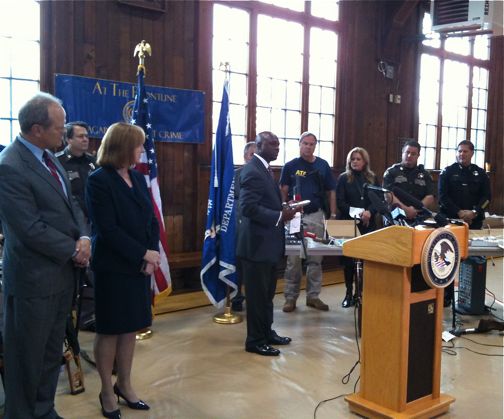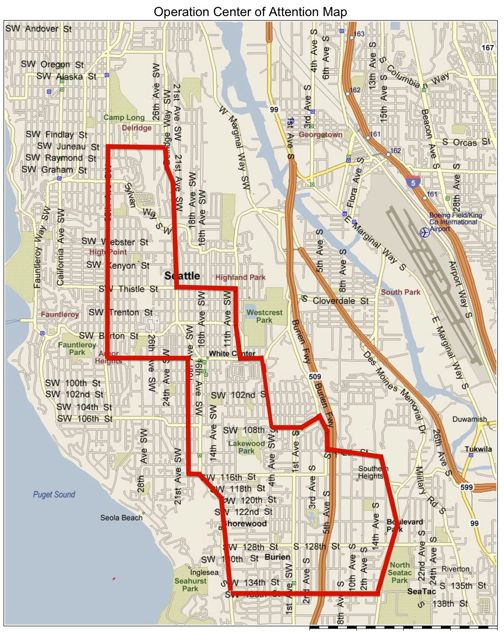By Tracy Record
White Center Now editor
Big turnout last night for the North Highline Unincorporated Area Council’s public-safety forum, first in a series of quarterly events. The 50 or so attendees identified themselves in introductions as having come from not just the greater North Highline area but also points north and south, including West Seattle and even Federal Way.
LIQUOR CONTROL BOARD UPDATE: Lt. Woodrow Perkins opened with an update on Papa’s Pub (WCN broke the news earlier this week that the pub had proclaimed itself closed). They’ve been accused of five violations, he noted, mentioning the administrative-law hearing that was reported here yesterday, next Monday-Tuesday. He says their officers have tried to contact the owner and their perception is that there’s a chance they might reopen, though that couldn’t happen if they ultimately lose their license as a result of this process. Before GAME Lounge closed, he added, two liquor violations were filed against its owners. He also mentioned the Wah Long bar in Burien, which had been hit with three administrative-law violations. There was a hearing last October; the final decision is still pending but “pretty close,” said Lt. Perkins. In Burien, Wah Long has a new owner but that new owner does not have a liquor license at this point, he said. He also was asked about effects of I-1183, mentioning that statewide, there already are more than 100 applications for licenses to sell hard liquor (grocery stores, etc.). June 1st is the transition date.
KING COUNTY SHERIFF’S OFFICE CHANGES: Deputy BJ Myers had mentioned this at the last NHUAC meeting, and Major Jim Graddon went into more detail, saying that KCSO is moving to a “zone command” with captains in charge, rather than the historic “precinct” style. He will remain in charge at the city of SeaTac, though, Maj. Graddon said. “It’s an efficiency thing for the Sheriff’s Office; it’s a necessary thing to do,” he noted. “We’re in a time where we have to be smarter about the way we do things.”
WHITE CENTER STOREFRONT DEPUTY UPDATE: Next, Deputy Myers reviewed current trends/happening. He says Papa’s Pub’s closing “is definitely going to have an effect on crime in the downtown area.” Meaning, he said, some types of crime “are going to move to other bars. … We’re going to other bars and seeing some of the people we’d been running into at Papa’s.” Auto thefts are running higher than usual, he acknowledged, saying detectives are monitoring whether it’s a “statistical fluke” or whether something else is going on. Deputy Myers was asked about recent robberies, including the one earlier Thursday in South Delridge – while it resembled the MO, he said there were things that led them to believe it likely wasn’t the same people. … One member of the audience reminded everyone that it’s important to report ANYTHING that happens, so KCSO knows where to focus people, and Deputy Meyers underscored that, mentioning the online reporting system too. (If you want to report something online to King County Sheriff’s Office – the link is at the bottom of this page.)
GANG BRIEFING: The main event was a presentation by Detective Joe Gagliardi from the King County Sheriff’s Office. We recorded his entire briefing on video. It includes some obscenity, and many photos – of tags, of suspects, of gang names, things we don’t usually include in our coverage here on WCN (or on partner site West Seattle Blog), but we’re making an exception for a public presentation made by a law-enforcement officer who specializes in gangs. If you want to know the difference between gang graffiti and non-gang graffiti, how those giant tags wind up on walls alongside freeways, why the demographic makeup of gangs isn’t what you would think, and whether gang activity is really pervasive in this area – just watch:
Our video stops before the Q/A, but one thing was of note during it: Det. Gagliardi said the number of gang cases dropped by almost a third when Club Evo(lucion) in downtown WC “went away,” since while it was open, “we’d have 5, 6, 7 gang cases, easily.”
WHAT CAN YOU DO? Dan Carew spoke about the newly convened Suburban Coordinating King County Council on Gangs. They are doing a community gang assessment to figure out what the problem really looks like – going through data including demographics, law-enforcement stats, intelligence, incident reports, school surveys, community input and resources – “what do you think should be done?” There’s a survey you can take online – and they hope you will take a few minutes to complete it:
http://www.surveymonkey.com/s/KCGang
BLOCK WATCH: Community activist Gill Loring spoke about how it works; he’s a Block Watch captain in his area of North Highline/White Center. “You get to know people,” for starters, talking with them; as a Block Watch captain, you gather information, interact with deputies, organize the annual Night Out neighborhood event. Deputy Myers said, “It’s one of the most effective and least costly forms of law enforcement in the nation.” The deputy said he wants to “encourage the strength of our Block Watch program.” He wants to hear from everyone who is already involved in a Block Watch to make sure he has accurate information. Gill said he’s talked to people who are “scared to get started” because they’re afraid it will “take too much time” – he says that’s a myth, it does not take that much time. An attendee also offered the reminder that Block Watches can be good for more than crime prevention – it also means that in case of disaster, like an earthquake, you can more easily join forces with your neighbors to deal with the situation.
WHAT’S NEXT: NHUAC council member Richard Miller also happens to be the chair of the West Seattle Crime Prevention Council, and he invited everyone present to attend its next meeting, 7 pm February 21st at the Southwest Precinct (Delridge and Webster). The next public-safety forum for NHUAC will be in May; they’re hoping to have them quarterly.









